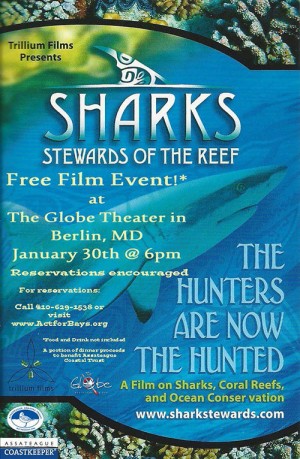
BERLIN — A series of wildlife and conservation focused films are coming to Worcester County this winter, and a free showing of the award-winning 2006 film “Sharks: Stewards of the Reef” will launch the event.
 Director Holiday Johnson met last week with The Dispatch to discuss her movie, the upcoming film screenings and the role of documentaries as a tool for conservation.
Director Holiday Johnson met last week with The Dispatch to discuss her movie, the upcoming film screenings and the role of documentaries as a tool for conservation.
With the tagline “the hunters are now the hunted,” the movie examines the practice of “shark fining,” the removal of fins from an often live shark. According to Johnson, the practice has sparked a rapid decline among many shark species in certain areas. Fins are often the main ingredient in a soup that is popular overseas.
In China especially, noted Johnson, shark fins are highly prized as a delicacy. China’s recent economic boom means that more people can afford the dish than ever before.
“Because the wealth has increased so much and there is more accessibility to these things … now every middle class person in China can afford to have a wedding with shark fin soup. It’s a status symbol,” she said. “So the demand for shark fins has just skyrocketed.”
The increased demand has had a hard impact on a number of shark populations, including Pacific reef sharks, the main focus of Johnson’s film. Reef sharks have been some of the hardest hit due to their accessibility compared to their ocean roaming cousins.
“Whereas reef sharks, they tend to be more localized so they are particularly more vulnerable because they’re much easier to catch,” Johnson explained. “And I did unfortunately witness a drastic [population] decline.”
Threatening any shark population can have a negative impact on the entire local eco-system due to the fact that sharks are apex predators. Beyond the dangers of a falling population, the movie highlights how the practice of fining can be disturbingly violent. Since shark meat isn’t usually in high demand, some sharks will have their fins removed and then be tossed back alive into the ocean.
“It’s an incredibly brutal practice, as well, and incredibly wasteful, of course. And because of their breeding cycles they are just getting decimated,” she said.
In its initial run through numerous film festivals, the movie collected several awards for short films and nature documentaries. A veteran filmmaker, Johnson also created “The Last Stand,” an in-depth look at declining red wood forests and the lumber industry.
Both films have had an impact outside of the award circuit. Her movie on sharks especially has been used to prompt change, receiving translations into several languages and used in cases where fining regulations have been examined.
In many parts of the United States, it is currently illegal to fin live sharks, including Maryland. Johnson hopes it will become illegal in all states and globally, though that’s a much tougher fight.
All of her work is the combination of two passions: environmental conservation and making movies.
“So I really came at it actually as an activist … One thing that interests me is looking at some of the economic factors that are driving environmental problems because you can’t separate the two,” she said.
It’s a theme that is likely to run through many of the films being highlighted over the next month. The screening series is sponsored by Assateague Coastal Trust (ACT) and begins with a free showing of Johnson’s film on Jan. 30 at The Globe in Berlin.
On Feb. 21, the 3rd Annual Wild and Scenic Film Festival will be held at Seacrets’ Morley Hall followed by a “family-focused” version of Wild and Scenic on Feb. 22 at the Sarbanes Center near the entrance to Assateague Island.
The showing at Seacrets will include 13 short films while the screening at Assateague will include three additional films meant specifically for families and children.
A portion of proceeds from dinner at The Globe on Jan. 30 will support ACT while the Wild and Scenic showing at Seacrets will include discounted food and drink options, raffles and a silent auction. The showing at Assateague will feature a Renewable Energy Lab for kids offered by ACT’s Coastal Kids program.
There’s something for everybody, according to Johnson, with the films examining all forms of nature and conservation.
Johnson, who sits on ACT’s Board of Directors, will introduce her film and be available for questions after the screening. Having re-located to Maryland from California a year ago, Johnson is looking locally for her next big idea.
“I’ve been looking locally to see if there are any local issues that can be highlighted, but I’ve not found that project yet. It’s really got to call to you because it is such an endeavor. When I choose topics, I look for those really volatile kinds of issues that there is a lot of importance and urgency around the issue as well as a lot of interest,” she said.
For more information on ACT’s film series, visit actforbays.org or call 410-629-1538.
